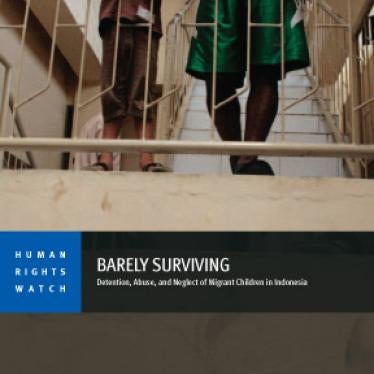Human Rights Watch today called for increased protection of Burmese refugees in Thailand. As the annual Asian Development Bank meetings begin in Chiang Mai from May 6-8, the international human rights group expressed concern over a worrisome shift in the implementation of Thai refugee policy.
Burmese refugees in urban areas, including Chiang Mai, are increasingly vulnerable to arrest and, in a few cases, have been forced to return to Burma," said Joe Saunders, deputy Asia director at Human Rights Watch. "The Thai government has legitimate security concerns, but those concerns do not justify acts which endanger refugees. With no let-up in abuses on the Burmese side of the border, this is absolutely not the time for repatriation initiatives."
Thai policymakers apparently have made a decision to reduce the number of Burmese refugees in Bangkok and other urban centers, and to regulate more closely the movements of Burmese refugees in the country. In one particularly egregious incident in February, five Burmese in Bangkok were transferred to the border and then deported into Burma at Friendship Bridge. They were reportedly met on the other side by Burmese authorities and later incarcerated.
The new direction in Thai refugee policy is in part a response to the siege of the Burmese Embassy in Bangkok in October 1999 and that of the Ratchaburi Provincial hospital in January 2000. The embassy and hospital sieges were the work of small, radical organizations, but the Thai government has used the incidents to justify a wider crackdown that affects the entire population of urban Burmese.
Details on the change in policy are set forth in a "Background Briefing" on Thai policy toward Burmese refugees, along with recommendations from Human Rights Watch. The document is linked to this release in "related material" above.
In addition to the new pressures facing existing refugees in urban areas, a new admissions procedure in border regions poses dangers for newly arriving refugees. Although the decision to adopt review procedures represents a positive development in Thai refugee policy, the way the procedures are being implemented is not providing protection to refugees in need, putting many at risk of rejection and forced return.
The Thai government is not a signatory to the 1951 Convention relating to the Status of Refugees or its 1967 Protocol, which provide a universally accepted definition of a refugee, nor does it have its own domestic refugee law to offer legal guidance. The traditional Thai definition of a refugee used in official statements translates as "person fleeing conflict." The U.N. High Commissioner on Refugees has pressed the Thai government to accept a broader definition of persons fleeing conflict and the effects of conflict, which would include a range of issues including forced relocations, forced portering and forced labor. According to Human Rights Watch, even this expanded definition falls short of what is needed to protect comprehensively Burmese refugees in Thailand. Instead, Thailand should base its decisions on whether the conditions which forced Burmese to flee their homes are such that they are deserving of international refugee protection.
In February, heightened security concerns for the Bangkok UN Conference on Trade and Development (UNCTAD) meeting contributed to growing pressure on Burmese refugees and a crackdown on NGOs working on issues related to Burma.





